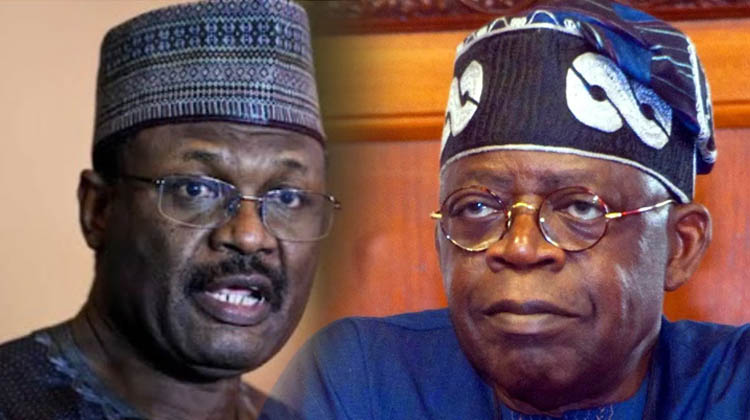INEC Chairman, Prof. Mahmood Yakubu and Asiwaju Bola Tinubu.
The public outcry over the appointment of certain Resident Electoral Commissioners could foreshadow concerns about the conduct and integrity of the 2027 general elections. RECs play a crucial role in organising elections in Nigeria and are expected to be neutral individuals of proven integrity. This is essential to upholding the credibility and legitimacy of the electoral process.
However, some of the RECs appointed by President Bola Tinubu in October 2023 were alleged to be card-carrying members of the ruling All Progressives Congress. These include Etekamba Umoren (Akwa Ibom), Isah Shaka Ehimeakne (Edo), Bunmi Omoseyindemi (Lagos), and Anugbum Onuoha (Rivers).
Recently, the Socio-Economic Rights and Accountability Project, a civil society group, called on Tinubu to review those appointments. SERAP argued that the inclusion of alleged partisan figures in the Independent National Electoral Commission could undermine the credibility of the 2027 elections.
Section 156(1) and Part 1, Item F, Paragraph 14(2) of the Third Schedule of the 1999 Constitution, as well as Section 6(4) of the Electoral Act 2022, contain provisions that stipulate that RECs shall not belong to political parties and shall possess unquestionable integrity.
Yet, there have been breaches of these constitutional provisions. For example, in 2019, the Senate rejected Olalekan Raheem’s nomination as REC for allegedly being an APC member.
In October 2020, former President Muhammadu Buhari nominated his Personal Assistant on Social Media, Lauretta Onochie, as a National Commissioner of the INEC. Many Nigerians, including civil society organisations, opposed it. The Senate was forced to reject her nomination.
Ahead of the 2023 general elections, the opposition Peoples Democratic Party and others petitioned against the then REC in Lagos, Olusegun Agbaje, accusing him of partisanship. However, no action was taken.
In the September 2024 Edo State governorship election, Onuoha, a cousin of Federal Capital Territory Minister Nyesom Wike, served as REC despite complaints from the PDP and others. INEC refused to redeploy him, and the election proceeded under controversial circumstances. Curiously, Onuoha is now the President’s appointed REC for Rivers State.
Regrettably, Section 154(1) of the Constitution and Section 6(3) of the Electoral Act grant the President broad powers to appoint RECs. This authority is too expansive and should be narrowed to ensure the selection of more neutral individuals.
In the United States, the President nominates commissioners for the Federal Election Commission, who are then confirmed by the Senate. The FEC is an independent agency that oversees campaign finance laws.
Nigeria’s challenge lies in the political elite’s tendency to undermine democracy, often with judicial complicity and impunity.
The do-or-die politics entrenched in the polity, stemming from politicians’ desperation for access to state power and resources, underlie the repeated insidious attempts to exert undue influence on the electoral umpire. This must be resisted at every turn.
Similar issues exist elsewhere in Africa. In Tanzania, President Samia Hassan has been accused of sidelining the opposition.
With presidential and parliamentary elections scheduled for October, the main opposition party, CHADEMA, was disqualified from the polls for allegedly failing to sign an election code of conduct. The party has been advocating for electoral reforms.
Nigeria’s opposition parties are well-positioned to scrutinise the REC nominees’ backgrounds. Any nominee found unworthy should be identified and removed.
There is a pressing need to amend the electoral legal framework to empower an independent body to appoint RECs. INEC itself has proposed that such authority be vested in the commission, arguing that this would enhance transparency, accountability, and efficiency in the electoral process. This recommendation is worth serious consideration.
Robust background checks on REC nominees should be mandatory before appointments are confirmed, and such confirmations should take place in a plenary session of the National Assembly.
Nigerians must remain vigilant, actively questioning and rejecting unsuitable candidates.
The Punch





